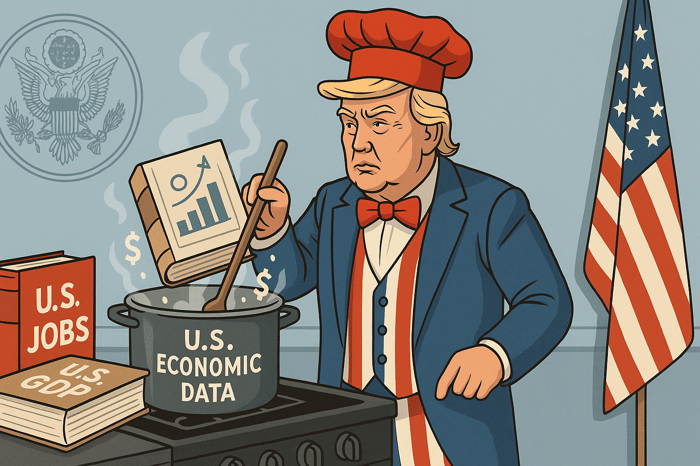Table of Contents
- Is Trust in US Economic Data In Jeopardy?
- A Matter Of Trust in US Economic Data
- Alternative Sources Bolster Trust in US Economic Data
- Eroding Confidence or Strengthening Resilience: The Stakes for Trust in US Economic Data
- Final Thoughts: Can Trump Manipulate Jobs Data or Just Undermine Trust in US Economic Data?
- FAQs
Is Trust in US Economic Data In Jeopardy?
Trust in US economic data was shaken by Friday’s dismissal of Bureau of Labor Statistics (BLS) Commissioner Erika McEntarfer, a Biden appointee installed in January 2024. The firing came after a weak July jobs report and major downward revisions for May and June. This article examines the possible motivations behind the firing and evaluates whether the Trump Administration can realistically alter or undermine trust in US economic data. It explores how resilient America’s economic data infrastructure truly is. It also considers whether the act serves a broader political strategy—one that seeks to discredit unfavorable numbers in advance, erode institutional trust in US economic data, and reshape public perception of economic reality.
President Trump alleged the data was “rigged” and claimed unemployment figures were manipulated to make him look bad despite lacking evidence. The move has alarmed economists across the political spectrum and federal statistical professionals, amplifying fears that a symbolic gesture may reflect deeper efforts at institutional capture.
The BLS, a 140-year-old agency, plays a critical role in producing the monthly jobs report—one of the most watched economic indicators in the world. Markets move, policies shift, and public sentiment swings based on the data this agency publishes. While presidential administrations often disagree with the interpretation of economic numbers, direct interference with the professionals who compile them is rare and potentially destabilizing.
Key Dates: Trump’s Attacks on Official Economic Data
| Date | Event |
|---|---|
| August 1–2, 2025 | Trump fired Bureau of Labor Statistics Commissioner Erika McEntarfer after a weak July jobs report showed only 73,000 new jobs and large downward revisions to prior months. Trump called the data “rigged.” Vox article |
| August 2, 2025 | Financial markets reacted sharply to the firing, with concerns over the credibility of economic data and fears of politicization. Washington Post, Barron’s, Washington Post (jobs report) |
| July 2025 | Trump repeatedly disputed inflation data, calling critics “Panicans” and rejecting official inflation metrics. He blamed tariffs for no price increases and pressured the Fed to cut rates. Newsweek, ABC News, White House Statement |
| August 2–3, 2025 | Bipartisan concern grew about the integrity of economic data and Trump’s apparent use of political tactics similar to authoritarian regimes. TIME Magazine |
A Matter Of Trust in US Economic Data
To understand whether Donald Trump—or any president—can manipulate economic statistics, we must first examine how these data are produced. Agencies like the Bureau of Labor Statistics (BLS), Bureau of Economic Analysis (BEA), and Census Bureau operate under long-established statistical protocols, insulated—at least in theory—from political interference. Career civil servants, not political appointees, typically design the surveys, collect the data, and apply statistical methods according to documented standards. These processes are deeply entrenched and complex, and for good reason: They are the bedrock of public policy, market confidence, and international credibility.
However, while the data process is bureaucratically and methodologically guarded, it is not immune to manipulation. A president cannot simply order the inflation rate to be changed, but he can influence leadership appointments, shift internal incentives, reallocate funding, or undermine trust in the results. The Trump administration, for example, frequently floated the idea that the unemployment rate was "phony" or that inflation was "fake." These assertions laid groundwork for suspicion, even if the data itself remained unchanged.
This is precisely why questions about whether Trump can manipulate jobs data are no longer abstract hypotheticals—they’re practical concerns facing financial advisors, economists, journalists, and the markets .
The concern now is whether a second Trump term would go beyond rhetoric. If the goal is to inject loyalists into key agencies—especially those responsible for the timing, framing, or interpretation of economic releases—the door to subtle manipulation opens. Imagine a scenario where a jobs report’s methodology is quietly revised to downplay labor force exits, or a GDP report is delayed due to "technical review." These are small moves, but they could erode credibility quickly.
Even if the numbers themselves remain untouched, damage can be done by casting doubt. In a hyper-partisan environment, simply raising the possibility of fraud in statistical releases may be enough to destabilize public faith and undermine trust in US economic data.
Alternative Sources Bolster Trust in US Economic Data
Despite the prominence of government statistics, the U.S. economy is monitored by a wide ecosystem of non-governmental data providers. This diversity creates a natural buffer against political tampering. The stock market, consumer behavior, and business trends are continuously tracked by independent entities—some of which have more immediate credibility among investors and analysts than official government reports.
For instance, the Conference Board's Leading Economic Index (LEI) provides a forward-looking measure of economic activity and is widely followed by institutional investors. Private payroll firms like ADP release monthly employment data ahead of the BLS, offering a benchmark—even if imperfect—for jobs numbers. The ISM manufacturing and services indices, the NFIB Small Business Optimism Index, and the University of Michigan's Consumer Sentiment Survey all come from non-governmental sources and shape market expectations.
These alternative sources serve as a vital check on government narratives, especially if people begin asking whether can Trump manipulate jobs data becomes a real possibility.
Additionally, the real estate market relies heavily on data from sources like CoreLogic, Zillow, and Redfin, which provide up-to-the-minute views on home prices and supply. . Similarly, commodity prices, shipping activity, auto sales, and retail data are collected by industry groups and research firms. These data streams provide an important reality check on official numbers—especially in a digital age where real-time private data can expose discrepancies.
Eroding Confidence or Strengthening Resilience: The Stakes for Trust in US Economic Data
While institutional safeguards exist, their strength depends on the willingness of leadership to respect them—and the vigilance of external actors to hold them accountable. Congressional oversight, press scrutiny, and watchdog organizations like the American Statistical Association are vital to ensuring that even subtle interference is detected and called out.
In the long run, even sustained rhetorical attacks—let alone firings or political appointments—can lead to staff attrition, delays in methodological updates, and lower morale inside agencies. That, in turn, degrades data quality even if no numbers are outright fabricated. And when confidence erodes, rebuilding it is far harder than preserving it in the first place.
This is not just a political issue—it’s a governance issue. Whether the public trust in US economic data will shape how Americans respond to recession warnings, stimulus decisions, inflation controls, and labor policy. Once doubt takes root, it becomes harder to govern effectively across the board.
Final Thoughts: Can Trump Manipulate Jobs Data or Just Undermine Trust in US Economic Data?
In theory, the U.S. economic data system is resilient. In practice, its integrity depends on the people in charge. The firing of the BLS commissioner may not result in immediate statistical fraud, but it sends a message: that career experts can be punished for delivering bad news. That’s a dangerous precedent.
It’s less about direct manipulation and more about soft power—eroding trust in US economic data, reshaping narratives, and undermining institutions. If we want to preserve objectivity in the numbers we rely on, we must take these moves seriously—no matter how symbolic they appear on the surface.
And that’s why the question—can Trump manipulate jobs data—will only grow more urgent as we approach another election and another potential term.
On Tuesday, August 19, 2025, Fritz Meyer, an independent economist, is leading a live financial economic update and will give his thoughts on this matter.
FAQs
Why was the BLS Commissioner fired?
Commissioner Erika McEntarfer was dismissed following a weak July jobs report and downward revisions for May and June. Trump alleged manipulation, despite offering no evidence.
Can a president change economic data?
Not directly. Data is produced by career civil servants using established methods. But presidents can influence leadership, funding, and public trust.
What is the risk of politicizing the BLS?
Undermining trust in economic data can destabilize markets, erode public confidence, and weaken policymaking.
Are government stats the only source for economic data?
No. Independent firms like ADP, the Conference Board, and Zillow provide alternative metrics, helping validate or challenge official data.
How reliable are non-governmental sources?
While not always perfectly aligned, private data sources offer real-time insights and are often trusted by markets and analysts as supplementary or leading indicators.




